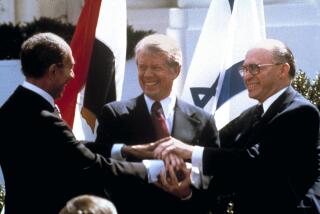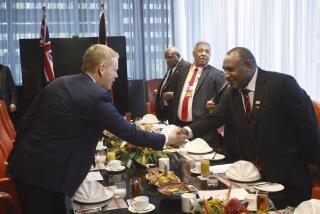Cambodia Pact: Turning Point for U.S., Ex-Foes?
PARIS — Secretary of State James A. Baker III arrived here Tuesday prepared to sign the Cambodian peace accord that will “open the way” to normalizing U.S. relations with Vietnam and other former enemies in Southeast Asia, a senior U.S. official said.
The reconciliation is expected to take at least two years as the complex Cambodian settlement is implemented and, at least equally important, as progress is made toward resolving U.S. prisoner-of-war and missing-in-action cases, the official explained.
About 119 such cases have top priority, he said. All involve “discrepancies” between the apparent capture of U.S. servicemen two decades ago and Vietnamese claims of having no knowledge of these Americans.
The Cambodian agreement, to be signed today by 18 nations including Vietnam, China and the Soviet Union, provides for United Nations peacekeepers to disarm combatants, administer the country and supervise elections to settle the four-sided civil war that has continued since 1975.
The official said “concrete steps” can be expected by Washington after the agreement is signed, such as lifting the trade embargo against Cambodia and, he implied, concessionary moves toward Hanoi.
The broad American message to be conveyed at the peace conference here is that the United States is seeking “to promote the process of reconciliation” among Southeast Asian nations and between itself and those nations, the senior official traveling with Baker said.
The Cambodian agreement, together with the Persian Gulf conflict, “allows us to turn the page on the Vietnam War,” he said. The Gulf conflict demonstrated that the U.S. military has regained its confidence and capability, while the Cambodian settlement will open the way to reconciliation on a broad front, he added.
The pace of normalizing relations will vary with each of the three Indochina nations, he said. With Laos, it will depend on Laotian cooperation on narcotics and MIA-POW issues and with Cambodia on compliance with the peace settlement. With Hanoi, “it will really depend on how fast our POW-MIA concerns can be resolved,” he said, predicting that the process “will be played out over several years.”
More to Read
Sign up for Essential California
The most important California stories and recommendations in your inbox every morning.
You may occasionally receive promotional content from the Los Angeles Times.










